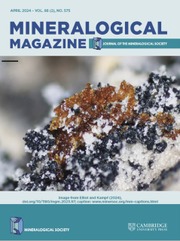Article contents
Oskarssonite, AlF3, a new fumarolic mineral from Eldfell volcano, Heimaey, Iceland
Published online by Cambridge University Press: 05 July 2018
Abstract
The new mineral oskarssonite (IMA2012-088), with ideal formula AlF3, was found in August 2009 at the surface of fumaroles on the Eldfell volcano, Heimaey Island, Iceland (GPS coordinates 63°25′58.9″N 20°14′50.3″W). It occurs as sub-micron-sized crystals forming a white powder in association with anhydrite, bassanite, gypsum, jarosite, anatase, hematite, opal, ralstonite, jakobssonite and meniaylovite. Chemical analyses by energy-dispersive spectrometry with a scanning electronmicroscope produced the following mean elemental composition: Al, 31.70; F, 58.41; O, 9.22; total 99.33 wt.%. The empirical chemical formula is AlF2.6(OH)0.5 which suggests partial substitution of F by OH. Oskarssonite is rhombohedral, space group R c, with ah = 4.9817(4) Å, c = 12.387(1) Å, Vuc = 266.23(5) Å3, Z = 6. The five strongest lines in the powder diffraction diagram [d in Å(I) (hkl)] are as follows: 3.54 (100) (012), 2.131 (13) (113), 1.771 (20) (024), 1.59 (15) (116), 1.574 (10) (122). Rietveld refinement confirms the identity of oskarssonite with the synthetic rhombohedral form of AlF3. Its structure can be described as a rhombohedral deformation of the idealized cubic perovskitetype octahedral framework of corner-sharing AlF6 groups. Oskarssonite appears in the surface part of the fumaroles where fluorides are abundant. At greater depths (below 10 cm) sulfates dominate among the fumarolic minerals. In accordance with its occurrence, we surmise that oskarssonite forms in the later stages of the fumarolic activity in an environment poor in alkalies and Mg. Ralstonite (NaxMgxAl1−xF3(H2O)y), which, unlike oskarssonite, contains Na and Mg as important constituents, dominated in the first-formed fumaroles, but now, 41 years after the eruption of Eldfell, is only a minor phase. The new mineral is named after the Icelandic volcanologist Niels Oskarsson.
c, with ah = 4.9817(4) Å, c = 12.387(1) Å, Vuc = 266.23(5) Å3, Z = 6. The five strongest lines in the powder diffraction diagram [d in Å(I) (hkl)] are as follows: 3.54 (100) (012), 2.131 (13) (113), 1.771 (20) (024), 1.59 (15) (116), 1.574 (10) (122). Rietveld refinement confirms the identity of oskarssonite with the synthetic rhombohedral form of AlF3. Its structure can be described as a rhombohedral deformation of the idealized cubic perovskitetype octahedral framework of corner-sharing AlF6 groups. Oskarssonite appears in the surface part of the fumaroles where fluorides are abundant. At greater depths (below 10 cm) sulfates dominate among the fumarolic minerals. In accordance with its occurrence, we surmise that oskarssonite forms in the later stages of the fumarolic activity in an environment poor in alkalies and Mg. Ralstonite (NaxMgxAl1−xF3(H2O)y), which, unlike oskarssonite, contains Na and Mg as important constituents, dominated in the first-formed fumaroles, but now, 41 years after the eruption of Eldfell, is only a minor phase. The new mineral is named after the Icelandic volcanologist Niels Oskarsson.
- Type
- Research Article
- Information
- Copyright
- Copyright © The Mineralogical Society of Great Britain and Ireland 2014
Footnotes
present address: FL Smidth R & D Center, Daniavej 49, Assens, Denmark
present address: Haldor Topsøe A/S, Nymøllevej 55, DK-2800 Lyngby, Denmark
References
- 7
- Cited by


